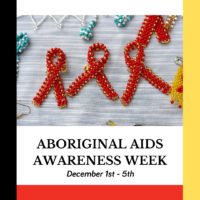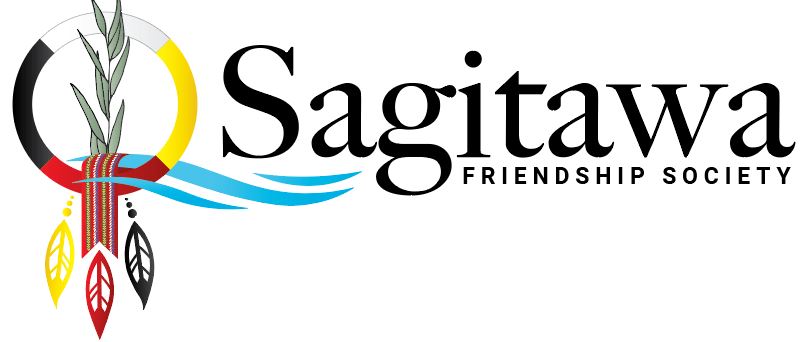
World AIDS Day – December 1st
Aboriginal AIDS Awareness Week – December 1st-5th
(Information provided by our friends at The Sagitawa Friendship Society)
World AIDS Day is December 1st, and it is important that we spread HIV/AIDS awareness in our community. You will see members of the community and staff of the Sagitawa wearing red ribbons on December 1st, and throughout the week as they are the international symbol of HIV and AIDS awareness. You will also see a few businesses lighting up red and find resources throughout their space. If you would like a red ribbon or information/support and resources on HIV/AIDS/STI’s or HEP C they can be found by contacting Alisha the Northern Indigenous Health Alliance-NIHA outreach coordinator at the Sagitawa Friendship Society.
Aboriginal AIDS Awareness week is scheduled every year beginning on December 1st and ending on December 5th. It is an opportunity to increase awareness and knowledge about HIV/AIDS, establish ongoing prevention and education programs in Aboriginal communities.
Address common attitudes that may interfere with prevention, care and treatment, and:
- Establish ongoing prevention and education programs in Aboriginal communities.
- Address common attitudes that may interfere with prevention, care and treatment activities.
- Reduce HIV/AIDS-related stigma and discrimination.
If you would like to connect with an Elder, Elder Dave Matilpi can be reached at the Sagitawa Friendship Society.
The Sagitawa Friendship Society’s NIHA program works alongside programs at the Friendship Centers in High Level, Grande Prairie and Silver Sage to provide increased supports and reduce stigma and discrimination for Indigenous people living with or at risk of HIV/AIDS, Hepatitis C, Sexually Transmitted Infections, and Blood Borne Pathogens in our northern region.
The program helps to reduce barriers that prevent Indigenous People Living with HIV/AIDS in the northern region, those at risk and those affected from accessing prevention, diagnosis, and treatment services. Together, the NIHA programs work to implement prevention programming directed at Indigenous people in the northern region living with HIV and/or hepatitis C and those at risk.
Want more info? Click on the link: Aboriginal AIDS Awareness Week | CAAN Home | CATIE – Canada’s source for HIV and hepatitis C information Northern Indigenous Health Alliance – Kimamow Atoskanow Foundation (treeofcreation.ca)
ADDITIONAL INFORMATION
-The Public Health Agency of Canada (PHAC) monitors the HIV epidemic in Canada. PHAC estimated that at the end of 2016 there were 63,110 Canadians with HIV. An estimated 86% of the people in Canada with HIV were diagnosed and aware they had HIV. This means that an estimated 14% ( An estimated 9,090 people) with HIV were undiagnosed at the end of 2016.
-6 Canadians are infected with HIV every day
-New HIV infections in Canada occur disproportionately among Indigenous people and people from countries where HIV is endemic.
-Almost 1 in 4 new HIV infections in Canada are among females
-14% of HIV-positive Canadians do not know their status
-While HIV does not discriminate and can affect anyone, Canada’s HIV epidemic is concentrated in key populations – a result of both biological risk factors and the social determinants of health.
-Indigenous people are 2.7 times more likely to get HIV than non-Indigenous Canadians, Canadians born in countries where HIV is endemic are 6.4 times more likely to get HIV
than other Canadians, people who inject drugs are 53 times more likely to get HIV then those who do not, Men who have sex with Men are 131 times more likely to get HIV than other men.
-Prevention is key, highly preventative measures include: Condoms, Pre-exposure prophylaxis (PrEP),Undetectable viral load and Harm reduction programs.
-Treatment has extended the life expectancy of a young Canadian living with HIV to their early 70s.
-You can’t treat the undiagnosed, get tested!
-HIV/STI testing is available at the Peace River hospital through Public Health and can be booked by calling.
-As part of our program here, Alisha can support those who are wanting to get tested with information and connection to other resources
-Alisha is a part of NIHA (The Northern Indigenous Health Alliance) and under employment by the Sagitawa Friendship Society. The HIV/STI/HEP C/STBBI program provides out-reach services, connection to resources, presentations to community members and agencies, provides sexual health harm reduction supplies.
-We encourage people to reach out whether they need information, safer sex supplies or support around HIV and Sexual Health.
-Alisha can be reached by calling 7806242443, and always has HIV/STI/HEP C/STBBI information/resources on hand.
-The program also offers harm reduction training for the community such as Naloxone Training.
-The Peace River Library will be featuring novels during AAAW week and will have HIV related resources on display both in the hotel and on their social media and will have a red light shone on the building.
-The Sawridge Inn and Conference center will also have HIV related resources around the entire hotel, as well as will be lighting up the outside of their building with Red lights (The color for AIDS Awareness) in support of this week.
-The Sagitawa will also be lighting up the business front red, have HIV resource material posted for the week inside as well as on social media.
The Sagitawa Friendship Society, 10108 100 AVE Peace River, AB 7806242443





